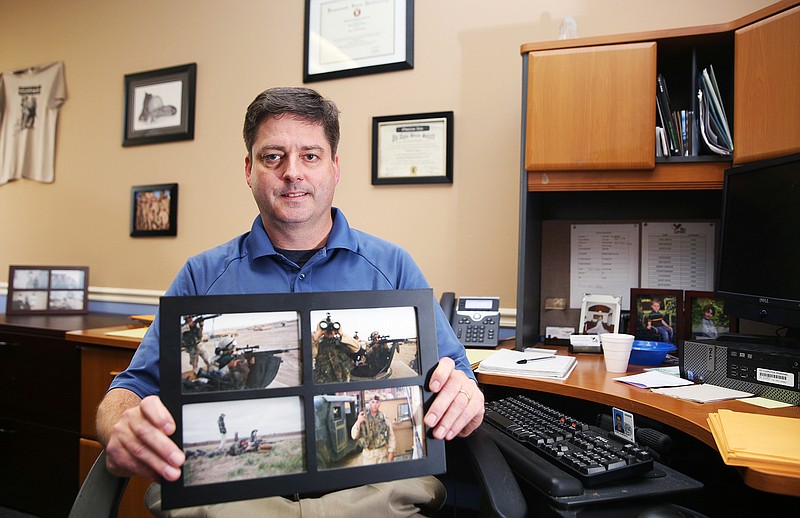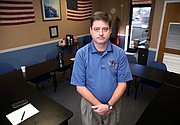In 2007, two years removed from his tour in Sadr City, Iraq, Chuck Ayars sat in the Chattanooga Vet Center, staring at a white board.
His readjustment counseling therapist, Michael Bearden, was drawing one of those charts with a line running up and down and another running left to right. The vertical line measured stress levels, from 1-10. The horizontal line measured the duration of that stress.
Those who have seen war may barely be on the chart, about as far to the top and to the right as you can go, explained Bearden, who served during Vietnam. He went further, teaching Ayars about the limbic system, the part of your brain that deals with your reactions. Within the system, your hippocampus may have shrunk; that explains why your short-term memory is an embarrassment while you can tell friends about a breakfast you had five years ago.
And then there are your synapses, Bearden said. The part of your brain that sends chemical signals between neurons. When you were at war, he told Ayars, the synapses worked at full force for hours. Reacting to bombs and brutal injuries, adrenaline pumped to your muscles and brain, your senses sharpened. With time, Bearden said, those parts of your brain may have fried like an overworked car engine. And now here you are, unable to transfer enough serotonin, a mood stabilizer.
Bio:
Name: Chuck AyarsAge: 48Home: Franklin, Tenn.Military branch and rank: U.S. Army, specialist

This is your life with post-traumatic stress disorder. Sounds depressing. But, Bearden said, time after time a veteran will appreciate the cold, blunt diagnosis. They no longer think they're simply weak. They understand something physically changed in them.
Ayars, 48, was among that group.
"It's an injury," he said. "I can handle that. I can deal with that."
Ayars was 33 when he enlisted in the Army, choosing to fight after watching 9/11 unfold on the news while sitting in the break room of a Nashville golf course. He was angry, like the rest of the country; he wanted to push back.
That spring, a couple months before basic training, he drove to New York City's financial district in a 1997 Toyota Corolla. He wanted to see the reason he was fighting.
But workers erected walls around the rubble of the World Trade Center. On the outside, he looked down at flowers and epitaphs. He read missing person fliers, pictures of hundreds of men and women, their names and ages typed underneath.
In March 2004, he arrived with his infantry division in Sadr City, located northeast of Baghdad. The city was nine square miles with a population of about 2.5 million Shias, a group persecuted under Saddam Hussein and the Ba'ath Party. The city had no sanitation system. Raw sewage ran down the streets. Trash stood piled and scattered almost everywhere. The schools and hospitals had no heat or air.
The U.S. military helped install infrastructure, and Ayars' primary job was to protect a road running from Baghdad to Sadr City.
But the city was unstable. In April 2004, a month after Ayars arrived, soldiers were ambushed by a Shia militia group, upset at the arrest of a top deputy, according to a CNN report at the time. Eight soldiers died. About 50 were wounded. The fighting is portrayed in "The Long Road Home," a National Geographic Channel miniseries airing this month.
"That just kick-started basically our whole year," Ayars said. "And basically our existence."
In September 2004, Sgt. Carl Thomas and Staff Sgt. Guy Hagy Jr. died from an improvised explosive device. In November, a bomb went off in a parked car next to Ayars, sending shrapnel into his arm. He was OK. But shrapnel cut through the back of another serviceman's shoulder, emerging out his chest. Of the 25 men in his platoon, 16 were wounded.
Ayars' tour of duty ended in August 2005 with an Army Commendation Medal with Valor Device, a Purple Heart and a Combat Infantry Badge. Back home, he named his son Thomas Hagy Ayars in honor of his fallen friends. He struggled with survivor's guilt, unresolved grief and PTSD. Brain trauma left him sensitive to light. He couldn't be in crowds, his adrenaline rushing too much as he searched for danger. Loud noises had a similar effect.
During an annual physical at the VA, though Ayars said nothing of his internal struggles, a doctor suggested he see a therapist at the Chattanooga Vet Center.
He then met Bearden. And he felt like he improved. And after a while, Bearden began working on him, telling Ayars he needed to become a counselor, too. Bearden knew Ayars wanted to help, and he thought Ayars could earn the respect of other veterans.
"Chuck has knowledge of what it's like," Bearden said. "He's been there, done that the worst of the worst."
Said Ayars: "At that time, I didn't know how to relate to other civilians so well. I thought I could at least relate to other veterans."
He earned a master's degree from Kennesaw State University through Vocational Rehabilitation, a program the VA offers. He has been a readjustment counseling therapist at the Chattanooga Vet Center since 2011.
He said he enjoys the work, meeting with veterans of World War II and the Korean and Vietnam wars. He feels like he's connected to this country's history. And when they see him, he takes to the white board, like Bearden did. He draws charts, tells them what happened to their brain.
He hopes they realize: There's nothing inherently wrong with them. They're injured. And they can work through an injury.
Contact staff writer Tyler Jett at 423-757-6476 or tjett@timesfreepress.com. Follow him on Twitter @LetsJett.

